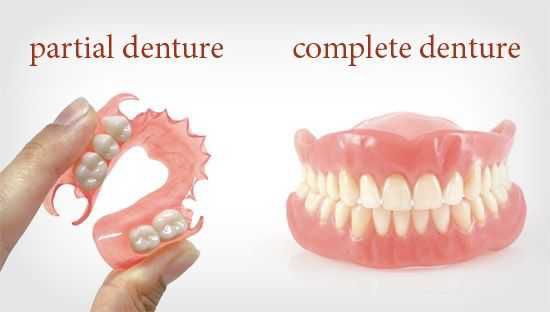Dentures are artificial teeth and gums that are molded to your mouth and designed by your dentists to restore lost or extracted natural teeth. They are detachable appliances that can substitute missing teeth and help revive your smile. In cases where all the natural teeth are lost due to gum infection, tooth decay, or injury; substituting missing teeth will majorly improve your presentation and your well-being. Dentures make it notably helpful to consume food and converse better than you could without teeth.
Dentures can either be complete or partial, meaning they can either substitute all teeth on either the top or rear gum line or just a few that are missing. Despite what kind of dentures you may need, they will be custom-created to fit your mouth and visually blend with your existent teeth.
Losing all of your teeth can make facial muscles droop, making you look more aged. Dentures can support filling out the features of your face and profile. They can be made to exactly match your natural teeth so that your appearance does not vary much. Dentures may even magnify the look of your smile. They need not be an alternative for many patients if they practice good home health care and have routine dental check-ups. However, here are some indicators that dentures may be required for your prospective dental health needs:
Multiple missing teeth:
Experts suggest that people who have expended more than two or three teeth explore prostheses to restrict excessive stress on the remaining teeth. But when patients depend on the usage of fewer teeth, there is a greater possibility of losing additional teeth in the future as the teeth left are worn down early or shift into wide spaces in the gum line.
Strain to eat certain foods:
Having trouble in consuming hard or chewy foods can be a notable indication. Predicaments with chewing foods with challenging surfaces can be a sign of tooth fracture, gum infection, decay, and other concerns that could ultimately result in removal and a necessity for tooth replacement.
Bleeding or swollen gums:
If you attend early gum disease aggressively, you might avoid permanent injury. However, if you let the periodontal condition progress until it induces tooth loss, you’re headed towards denture territory. Irritated gums are usually an assured sign of early-stage gingivitis or periodontal disease. Regrettably, gum disease is the cause of nearly 70% of adult tooth loss and concerns three out of four people during a certain period of their lives.
Irregular visits to your dentist:
Experts insist that attending the dentist is crucial. Semi-annual dental check-ups make it probable for minor problems to be detected and treated before radical damage occurs. When oral health problems are minimal, they are promptly corrected. However, once cavities and periodontal problems have a firm grasp, teeth may need to be extracted, and this can swiftly snowball into the requirement for dentures.
Gaps in teeth or loose teeth:
These symptoms often mean bone loss linked to undiscovered periodontal disease. If bone loss is critical, tooth loss may be unavoidable. According to dental health specialists, loose teeth often are an indication of advanced gum disease. In such circumstances, comprehensive periodontal treatment might be required, or these teeth might have to be removed.
Difficulty to smiling:
Some people get dentures for superficial reasons, even if their teeth are practically healthy. The vast numbers of denture wearers say they smile much more frequently after acquiring dentures. This factor determines that damaged or missing teeth influence how regularly you smile. There is no purpose for people to lose teeth in this time and age, unless they ignore them by not brushing, flossing and periodically visiting their dentist.

